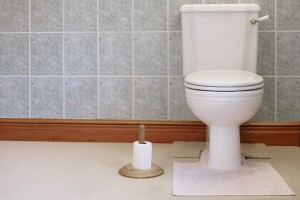 The wet wipes in your bathroom cabinet may say “flushable” or “disposable” but these wipes can actually wreak havoc on your plumbing system. While the packaging implies the wet wipes are safe for your pipes, cities across the country are realizing that simply isn’t the case.
The wet wipes in your bathroom cabinet may say “flushable” or “disposable” but these wipes can actually wreak havoc on your plumbing system. While the packaging implies the wet wipes are safe for your pipes, cities across the country are realizing that simply isn’t the case.
The materials that make up many of these types of wipes aren’t able to break apart and biodegrade quickly enough to make it through and into the sewer. Major blockages can occur when wet wipes are left to cling to the inner lining of pipes.
Why “flushable” isn’t a fair label
Strolling through the grocery store aisles would lead you to believe that manufacturers of wet wipes have created a quality product. The packages that indicate the wipes should be flushed or are safe for your septic system aren’t accurate.
The problem lies in the amount of time it takes for each wipe to breakdown. Because the fibers are thicker than toilet paper, the material can’t break down quickly enough, which can lead to major pipe clogs. Because of the slow breakdown, continuous use and flushing of the wipes creates a backup in the sewer line. A sewer main block can come with costly plumbing repairs.
Flushable wet wipes and clogged pipes
The pipes in your home and beneath your property accumulate residue overtime. Natural use of the plumbing system creates buildup from grease, hair, and other debris. That buildup begins to eat away at the flow rate of water and waste that moves through your pipes. The wet wipes can become snagged on the buildup, preventing the even flow of waste when you flush your toilets. As drains become slow to release water and toilets are unable to clear waste with one flush, it’s time to call a professional plumber to inspect your system.
Municipalities like New York City and Washington D.C. have spent millions of dollars trying to keep their sewage lines clear of these not-so-flushable wipes. Officials in Washington D.C. implemented a piece of equipment to shred the wipes as they pass through the sewer lines. The Bemus Point, N.Y.government set out to determine exactly which homes were flushing the wipes by creating traps along the sewer line. Letters and home visits were completed to urge the residents to stop flushing the “flushable wipes.”
What not to flush
The best way to avoid clogging your pipes with flushable wet wipes is to stop flushing them. When you use the towelettes to wipes your hands or face, toss them in the wastebasket. Stick with traditional toilet paper and avoid the major plumbing repairs that come with a blockage from these mislabeled products.
Routine plumbing maintenance is one of the best ways to detect and prevent clogs and blockages throughout your plumbing system. Schedule a yearly inspection with a local professional plumber to get an inside look at what’s happening in your pipes and how you can extend the life of your plumbing.
